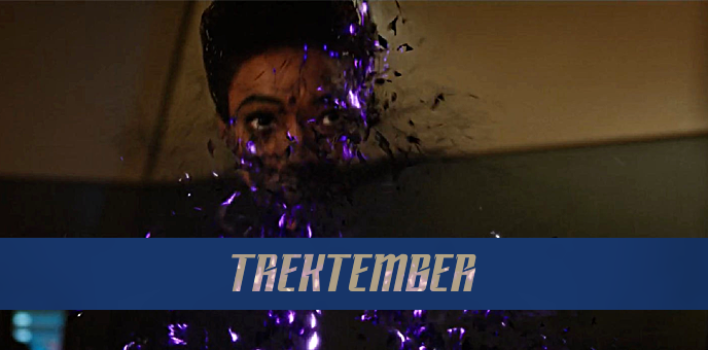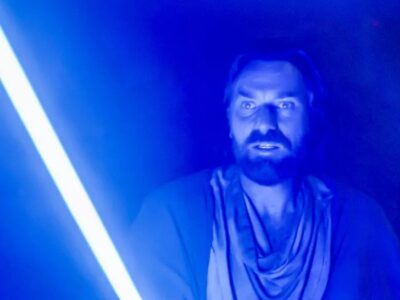Trektember: Magic to Make the Sanest Man Go Mad | Star Trek: Discovery
Read enough articles about Star Trek: Discovery, and you’ll start to see a repetitive phrase: “this is the first episode that really felt like Star Trek to me.” We’ve even had a couple of variations on that verbal “time loop” on this site in the past couple of weeks. Allow me to add my iteration: for me, the episode that really felt like Trek was this one. And, as the accompanying sentence often goes, “I liked the preceding episodes, but this is the first one that really had the right feel to it.”
“Magic to Make the Sanest Man Go Mad” is a by-the-book sci-fi story with a twist: Harry Mudd has locked the Discovery into a time loop until he can discover the secret of the Spore Drive, sell the ship to the Klingons, and kill Captain Lorca in revenge for what happened during the events of “Choose Your Pain.” Failing every time, the ship is destroyed and the loop resets. But Lt. Stamets, whose connection to the Mycelial Network has him cut loose from the regular flow of time, is able to pass notes from one loop to the next so that the Discovery crew can outwit Mudd and stop the loop.
The stable time loop story is a classic sci-fi staple; in fact, I wrote about The Next Generation’s take on the story in last year’s Trektember. Its twist is that, in more ways than one, they’re on the clock: eventually Mudd will learn what he needs to know and stop the loops.
It’s nice to see a self-contained, classic Trek story again, and it brings with it a lot of character development: turning Mudd into a dark and ruthless con man with shades of his eventual hapless nuisance is an interesting turn of character, we see Cadet Tilly in a fun new situation, and the growing relationship between Burnham and Tyler is painfully (but perfectly) awkward.
The plot is quite clever; I’ve never seen a weaponized time loop before, Lorca’s death montage was chilling (and maybe a little bit fun), the way Burnham convinced Mudd to restart the loop took me by surprise, and the crew’s final defeat of Mudd felt remarkably Kirk-esque. But the thing that felt the most Trek-like to me was the exploration of high concepts: in this case, the concepts of repetition, change, and how being known can change everything.
…and repetition and change and repetition and change…
Just as repetition reinforces repetition, change begets change. I guess the truth is, we never really know what’s coming. Sometimes, the only way to find out where you fit in is to step out of the routine.
—Michael Burnham
Michael’s personal log at the beginning of the show is about how she feels a comforting sense of routine and repetition, but still longs for personal change. That sense of routine quickly becomes literal, as the time loop begins and forces everything to repeat over and over again.
Burnham’s “one bad day” from the beginning of the season starts to repeat itself here: she sees her captain killed, she loses her ship and her crew, and she watches the Klingons come a big step closer to a final victory. And then it loops. Like the monologue in her head, events are chasing one another around endlessly and fruitlessly, leaving no impact on her actions.
This is not an unfamiliar feeling to many of us. Unglamorous situations, less-than-optimal jobs, and bad living arrangements rear their ugly heads in our lives, making us feel like we’re running on a treadmill with the speed turned way up. Even things we can directly control, like a besetting sin or a fatal character flaw, has a way of cropping up daily and making us think we’ll never win. Every day we wake up into it again, and when we go to sleep at night we haven’t made a single step toward progress.
The only option is to change, but that’s not easy. We have trouble taking the right lesson from our mistakes; and sometimes, like Burnham, we have trouble even remembering those mistakes in the first place. We need someone who can see outside of time to point us in the direction that works; to learn about us, to help us grow, to give us forward motion.
In this episode, Burnham needs to change and grow; and to do that, she needs help from someone who doesn’t forget with every loop. Someone who can help her grow. Someone who can know her well.
Known Outside of Time
I am among the others, but also apart. I wish sorely to step out of my comfort zone, but don’t know how.
—Michael Burnham
Stamets’ relationship with Burnham changes dramatically during the course of this episode. The change begun when he injected himself with the tardigrade DNA has continued, and his rough edges are being sanded off as he begins to form real relationships with the crew. And here, he begins working on Burnham; she has to grow beyond the social awkwardness and constant forgetting so that she can convince Tyler to help, but she can’t continue any character growth on her own.
So he does it for her.
Burnham reveals a desire to be known, to be included, to be a part of a group in her log at the beginning of the show. And in Stamets, by the end, she is known. In knowing her, he can overcome her forgetfulness; he can help her become better.
We, too, have to be known in order to grow; in order even to have the freedom to grow. We have to be known in order to change. And the one who knows us?
God’s firm foundation stands, bearing this seal: “The Lord knows those who are his,” and, “Let everyone who names the name of the Lord depart from iniquity.”
—2 Timothy 2:19, ESV
The seal he’s talking about is a signet ring signifying an official order, and the departing is actually starting a revolt: so what the Bible is actually saying is that God commands and empowers, as King, open rebellion against iniquity. He commands and empowers our growth and change. He allows us to die daily, taking up His cross and allowing Him to take our iniquity. Because we can’t do it, He does it for us.
And, even though it feels like we’ve done this before, He knows us. He welcomes us to dance with Him. And He gives us what we need to become the person He wants us to be. That’s the amazing power of being known by God.
As Burnham is known more and more, her deaths become increasingly meaningful. Over and over she dies; again and again, she’s destroyed. But as she’s known better, she becomes better. Finally, she realizes that she has to do what she couldn’t do back in episode 1: sacrifice herself to defeat her enemy.
It’s growth she could never have had if she weren’t known.
• • •
Trektember is an annual series about Star Trek; this year, we’re examining the first seasons of Star Trek: Discovery and The Orville. For more information on this series, click here; or, to read every article from the beginning, click here!








Pingback: Trektember: Si Vis Pacem, Para Bellum | Star Trek: Discovery | Reel World Theology
Pingback: Trektember: Season 3 Episode List | Reel World Theology
Pingback: Trektember: Season 3 Wrap-Up | Reel World Theology